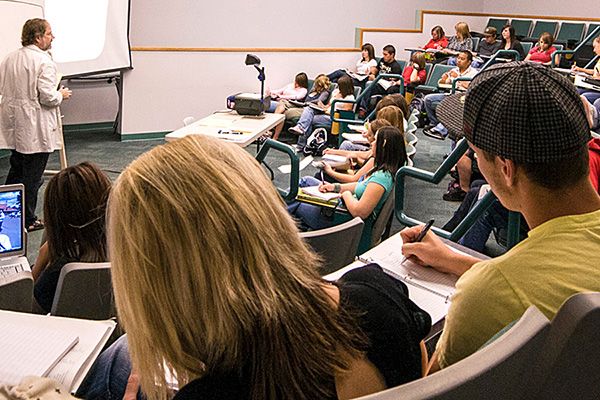- SCOPE OF PROCEDURE
- Applicability
- This procedure governs employee discipline that consists of a suspension without pay for longer than ten (10) days or dismissal from employment. This procedure applies to all non-probationary employees who have a contract of employment for a specified term with the College.
- Deans, directors, the controller and administrators may be dismissed from employment at any time without cause, although any contractual obligations to such individuals must be honored in the event of such a dismissal without cause. This procedure applies to such individuals in instances where the President proposes to suspend the individual without pay for longer than ten (10) days for cause, or to dismiss the individual from employment for cause.
- This procedure does not supersede the provisions in Procedures 2704 and 2970 that relate to affording employees an opportunity to improve their job performance.
- Grounds for Discipline
Discipline may be imposed for any conduct that is inconsistent with an employee’s duties, including but not limited to:- Unsatisfactory job performance, which includes incompetence in classroom instruction in the case of faculty members
- Inefficiency
- Neglect of duty
- Insubordination
- Dishonesty
- Use of alcohol in violation of College policy
- Current illegal use of drugs
- Absence without leave
- Conviction of a felony, or of a crime that would be a felony if committed in Arizona
- Conviction of a misdemeanor involving moral turpitude or behavior involving moral turpitude which adversely reflects on the College or affects the employee's suitability for continued employment
- Discourteous treatment of coworkers, students or the general public
- Misuse, unauthorized use or abuse of college property or funds
- Unsatisfactory attendance
- Loss of required qualifications, license or certification including, but not limited to, any third party or agency approval required by the employee's contract or contracts between the College and such third parties or agencies
- Falsification of any document, including the employment application
- Illegal discrimination
- Sexual or other prohibited harassment
- Habits or conduct which risk the safety or health of persons in the working environment or risk damage to property
- Violation of any portion of college policy or procedure
- Applicability
- PROCEDURE FOR DISCIPLINE
The employee may request a hearing with regard to the proposed discipline. The request must be in writing and must be received by the President within ten days after the employee receives the notice of intent to impose discipline. If a timely request for a hearing is not received, the President’s decision to impose discipline shall be final.
- Notice of Intent
- Before imposing discipline, the President shall provide the employee with written notice of the President’s intent to impose discipline. The notice shall be delivered in person or sent to the employee by first-class mail.
- The notice shall identify the discipline that is contemplated. The notice shall also identify the specific conduct that is the basis for the proposed discipline, including the names of witnesses. The notice shall identify any policies or laws that the employee is alleged to have violated. The notice shall be sufficiently specific that the employee will be able to prepare a defense.
- Once the President has given notice of intent to impose discipline, neither the employee nor the Administration shall discuss the merits of the matter with any Board member except in accordance with this procedure.
- Request for Hearing
- Assignment of Hearing Officer
- When an employee submits a timely request for a hearing, a hearing officer shall be appointed. The Board shall approve a list of acceptable hearing officers on an annual basis. Hearing officers shall be assigned from the approved list by the Chief Human Resources Officer or designee, who shall choose the first available hearing officer on the list according to a set rotation. In the event Board has not approved a list of acceptable hearing officers, a hearing officer shall be appointed by the Board.
- Once a hearing officer has been appointed, all issues shall be directed to the hearing officer.
- The Administration and the employee must raise any objection to the hearing officer’s impartiality, or to the manner of appointing the hearing officer, within ten (10) days of becoming aware of the grounds for such objections. Such objections shall be raised with the hearing officer. Any objections not raised in a timely manner shall be waived.
- Hearing on Proposed Discipline
- The hearing officer shall complete the hearing within thirty (30) days after being appointed. Continuances beyond that deadline shall not be granted except under extraordinary circumstances.
- An audio recording of the hearing shall be made unless the parties agree to a different approach to making a record.
- The Administration shall have the burden of showing, by a preponderance of the evidence, that the proposed discipline is warranted.
- Both sides may present evidence at the hearing. Both sides may be represented by counsel at their own expense.
- Within ten (10) days after completing the hearing, the hearing officer shall prepare a written recommendation to the President that includes relevant findings of fact and conclusions of law.
- Decision by the President and Appeal to the Board
- As soon as is practical after the President receives the hearing officer’s recommended decision, the President shall render a decision with regard to the proposed discipline.
- The employee may appeal the President’s decision to the Board by providing written notice of the employee’s desire to take such an appeal to the President within ten (10) days after receiving the President’s decision. If no timely notice is received, the President’s decision shall be final.
- The Board shall consider and decide any appeal as soon as is practical. The Board may, in its discretion, allow the Administration and the employee to present written and/or oral arguments regarding the proposed discipline and the hearing officer’s findings. The Board shall defer to the hearing officer’s findings of fact unless the employee or the Administration demonstrates that a finding is clearly erroneous. The Board’s decision shall be final.
- When the President’s decision is to dismiss an employee, the employee shall receive no further salary or benefits from the date of the President’s decision, other than salary and benefits to which the employee is already entitled. If the employee appeals and the Board does not uphold the President’s decision to dismiss the employee, the employee shall receive salary and benefits for the period of time between the President’s decision and the Board’s decision.
- Notice of Intent
- Home
- Policies
- Procedures
- Procedures Overview
- District Governing Board - 2000's
- College Operations, General - 2100's
- Information Services, General - 2200's
- Business Office - 2300's
- Marketing, Public Relations - 2400's
- Facilities - 2500's
- Student Services - 2600's
- Personnel, General - 2700's
- Personnel, Non-Exempt - 2800's
- Personnel, Faculty - 2900's
- Instruction - 3000's & 3100's
Discipline of Employees
Procedure 2755
Contact
Farah Bughio
Assistant to President/Recording Secretary to DGB
P.O. Box 610
Holbrook, AZ 86025
(928) 524-7418





